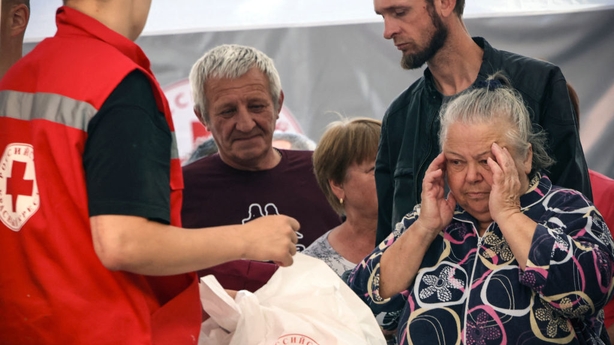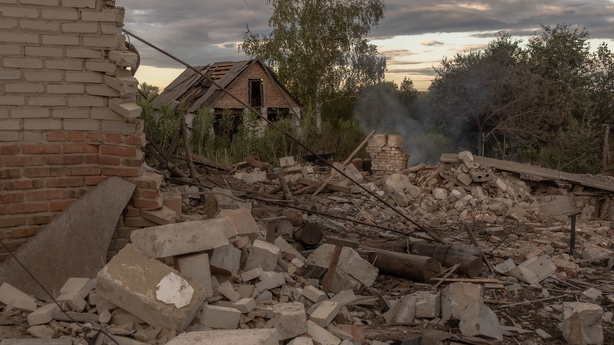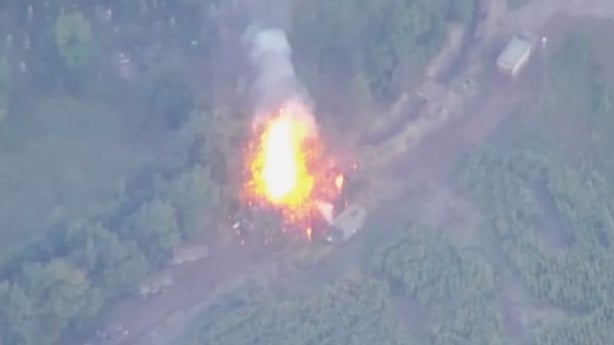Russia has said it would beef up border defences, improve command and control and send in additional forces nearly ten days after Ukraine made the biggest attack on Russian sovereign territory since World War II.
The lightning incursion into Russia unfurled on 6 August when thousands of Ukrainian troops smashed through Russia's western border in a major embarrassment for President Vladimir Putin's top military brass.
Russia's military, ranked as one of the most powerful alongside the United States and China, has yet to explain in public how Ukrainian forces were able to carve out a slice of the world's biggest nuclear power.
Mr Putin's defence minister Andrei Belousov said the general staff had prepared a series of measures to defend Russia's border regions of Kursk, Bryansk and Belgorod - which cover an area the size of Portugal.
"First of all, we are talking about improving the effectiveness of the command-and-control system in cooperation with other law enforcement agencies," Mr Belousov was shown telling top generals and officials from the Belgorod region.
Mr Belousov, appointed by Mr Putin in May, said Russia was "allocating additional forces and funds" to ensure the integrity and inviolability of Russian territory.

While the Ukrainian attack has revealed weaknesses in Russia's border defences and changed the public narrative of the conflict, Russian officials said what they cast as a Ukrainian "terrorist invasion" would not change the course of the war.
The United Nations' rights office meanwhile has asked Russia to allow it to visit regions affected by a cross-border attack by Ukrainian forces.
"I can confirm that the UN Human Rights Office has sent a request to the Russian authorities to facilitate access by the Office to areas of the Russian Federation affected by the hostilities, including Belgorod, Bryansk, and Kursk regions, further to our human rights monitoring and assessment mandate," Liz Throssell, a spokesperson for the Office of the United Nations High Commissioner for Human Rights.
Authorities in the Kursk region have decided to evacuate the population of its Glushkov district amid the continued advance of Ukrainian forces into the border region.
The district directly borders Ukraine and has a population of about 20,000 people.
Acting governor Alexei Smirnov said said on the Telegram messaging app that police and other state bodies would co-ordinate the evacuation process.
We need your consent to load this rte-player contentWe use rte-player to manage extra content that can set cookies on your device and collect data about your activity. Please review their details and accept them to load the content.Manage Preferences
Russia, which invaded Ukraine in 2022, has been advancing for most of the year along the 1000km front in Ukraine and has a vast numerical superiority. It controls 18% of Ukraine.
On the ground in the Kursk region, where Ukraine has carved out at least 450sq/km of Russian territory, both Ukraine and Russia claimed successes.
Russia said it had regained control of the settlement of Krupets in the Kursk region.
"We have burned everything that moves, everything that we have been able to find," Major General Apti Alaudinov, who commands Chechnya's Akhmat special forces who are fighting in Kursk.
Ukraine's top commander Oleksandr Syrskyi said Ukraine had advanced 1.5km over the past 24 hours and had set up a military commandant's office to ensure order.
A source in the Ukrainian Security Service said a group of more than 100 Russian soldiers had been captured.

Separately, a Ukrainian minister said Kyiv was carving out a buffer zone to protect its population against attack.
By bringing the war to Russia, Ukraine President Volodymyr Zelensky faces the risk of weakening Kyiv's defences along the front.
Ukraine said there was no sign Russian military pressure was receding along the eastern front and reported the heaviest fighting in weeks near Pokrovsk.
Russia said it had taken control of a village just 16km from the city, which sits abreast of major roads that supply Ukrainian forces in the area.
Mr Zelensky said he met top officials to discuss the humanitarian situation and establish a military commandant's offices "if needed" in an occupied area that Kyiv said exceeds 1,000sq/km.
"We continue to advance further in Kursk," Mr Zelensky wrote on Telegram, "from one to two km in various areas since the start of the day".
Later, in his nightly address, Mr Zelensky referred to the growing number of Russian prisoners of war taken in Kursk who could be exchanged for Ukrainian fighters.
"Our advance in Kursk is going well today - we are reaching our strategic goal. The 'exchange fund' for our state has also been significantly replenished."
Russia's defence ministry published footage which it said showed a Russian drone destroying a US-made Stryker armoured combat vehicle in the Kursk region.
Russian officials have warned that if Western weapons were used on Russian territory, then Moscow would consider that a grave escalation.
British weapons can be used by Ukrainian forces in operations on Russian territory, the UK's Ministry of Defence said today, but restrictions on the use of long-range Storm Shadow missiles remain.
Russia says it downs Ukrainian drones
Mr Putin has vowed to expel the Ukrainian troops. He said they aim, with Western backing, to give Kyiv a stronger hand in possible future ceasefire talks. But more than a week of intense battles have so far failed to oust them.
Ukraine's General Staff said Kyiv hit four Russian military airfields overnight in the Russian regions of Voronezh, Kursk and Nizhniy Novgorod, targeting fuel stores and aerial weapons. Mr Zelensky called the attack "timely" and "accurate".

The aim of the long-range drone strike was to undermine Russia's ability to attack Ukraine with glide bombs, a Ukrainian security source told Reuters on condition of anonymity. Ukraine's military said it had destroyed a Russian Su-34.
Moscow said it shot down 117 of the Ukrainian drones as well as four missiles. The Russian Defence Ministry posted a video on Telegram that it said showed Sukhoi Su-34 bombers striking Ukrainian positions in Kursk region.
Later, Russia's defence ministry said its forces had repelled a series of Ukrainian attacks inside Kursk, including at Russkoye Porechnoye, 18km from the border. Some pro-Russian war bloggers said the front had been stabilised, while state television said Moscow's forces were turning the tide.
Russia's National Guard said it was beefing up security at the Kursk nuclear power plant, just 35km from the fighting.
In the Russian border region of Belgorod, governor Vyacheslav Gladkov declared a state of emergency.

